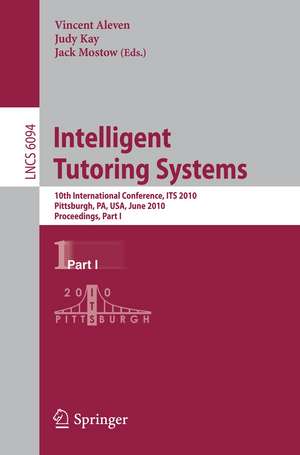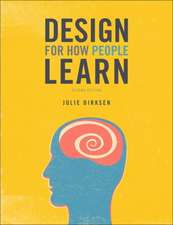Intelligent Tutoring Systems: 10th International Conference, ITS 2010, Pittsburgh, PA, USA, June 14-18, 2010, Proceedings, Part I: Lecture Notes in Computer Science, cartea 6094
Editat de Vincent Aleven, Judy Kay, Jack Mostowen Limba Engleză Paperback – iun 2010
| Toate formatele și edițiile | Preț | Express |
|---|---|---|
| Paperback (2) | 399.29 lei 3-5 săpt. | |
| Springer Berlin, Heidelberg – iun 2010 | 399.29 lei 3-5 săpt. | |
| Springer Berlin, Heidelberg – 4 iun 2010 | 401.24 lei 3-5 săpt. |
Din seria Lecture Notes in Computer Science
- 20%
 Preț: 1061.55 lei
Preț: 1061.55 lei - 20%
 Preț: 307.71 lei
Preț: 307.71 lei - 20%
 Preț: 438.69 lei
Preț: 438.69 lei - 20%
 Preț: 579.30 lei
Preț: 579.30 lei -
 Preț: 410.88 lei
Preț: 410.88 lei - 17%
 Preț: 427.22 lei
Preț: 427.22 lei - 20%
 Preț: 596.46 lei
Preț: 596.46 lei - 15%
 Preț: 448.04 lei
Preț: 448.04 lei - 20%
 Preț: 353.50 lei
Preț: 353.50 lei -
 Preț: 389.49 lei
Preț: 389.49 lei - 20%
 Preț: 309.90 lei
Preț: 309.90 lei - 20%
 Preț: 645.28 lei
Preț: 645.28 lei - 20%
 Preț: 763.23 lei
Preț: 763.23 lei - 15%
 Preț: 580.46 lei
Preț: 580.46 lei - 20%
 Preț: 310.28 lei
Preț: 310.28 lei - 20%
 Preț: 655.02 lei
Preț: 655.02 lei - 20%
 Preț: 1183.14 lei
Preț: 1183.14 lei - 20%
 Preț: 340.32 lei
Preț: 340.32 lei -
 Preț: 449.57 lei
Preț: 449.57 lei - 20%
 Preț: 591.51 lei
Preț: 591.51 lei - 18%
 Preț: 938.83 lei
Preț: 938.83 lei - 20%
 Preț: 337.00 lei
Preț: 337.00 lei - 20%
 Preț: 649.50 lei
Preț: 649.50 lei - 20%
 Preț: 607.40 lei
Preț: 607.40 lei - 20%
 Preț: 1414.79 lei
Preț: 1414.79 lei - 20%
 Preț: 1024.44 lei
Preț: 1024.44 lei - 20%
 Preț: 583.40 lei
Preț: 583.40 lei - 20%
 Preț: 453.32 lei
Preț: 453.32 lei - 20%
 Preț: 575.49 lei
Preț: 575.49 lei - 20%
 Preț: 1075.26 lei
Preț: 1075.26 lei - 20%
 Preț: 585.88 lei
Preț: 585.88 lei - 20%
 Preț: 825.93 lei
Preț: 825.93 lei - 17%
 Preț: 360.20 lei
Preț: 360.20 lei - 20%
 Preț: 763.23 lei
Preț: 763.23 lei - 20%
 Preț: 340.32 lei
Preț: 340.32 lei - 20%
 Preț: 504.58 lei
Preț: 504.58 lei - 20%
 Preț: 369.13 lei
Preț: 369.13 lei - 20%
 Preț: 580.93 lei
Preț: 580.93 lei - 20%
 Preț: 343.62 lei
Preț: 343.62 lei - 20%
 Preț: 350.21 lei
Preț: 350.21 lei - 20%
 Preț: 583.40 lei
Preț: 583.40 lei - 20%
 Preț: 583.40 lei
Preț: 583.40 lei - 15%
 Preț: 438.59 lei
Preț: 438.59 lei - 20%
 Preț: 341.95 lei
Preț: 341.95 lei - 20%
 Preț: 238.01 lei
Preț: 238.01 lei - 20%
 Preț: 538.30 lei
Preț: 538.30 lei
Preț: 399.29 lei
Nou
Puncte Express: 599
Preț estimativ în valută:
76.41€ • 82.97$ • 64.19£
76.41€ • 82.97$ • 64.19£
Carte disponibilă
Livrare economică 01-15 aprilie
Preluare comenzi: 021 569.72.76
Specificații
ISBN-13: 9783642133879
ISBN-10: 3642133878
Pagini: 468
Ilustrații: XXX, 437 p. 97 illus.
Greutate: 0.68 kg
Ediția:2010
Editura: Springer Berlin, Heidelberg
Colecția Springer
Seriile Lecture Notes in Computer Science, Programming and Software Engineering
Locul publicării:Berlin, Heidelberg, Germany
ISBN-10: 3642133878
Pagini: 468
Ilustrații: XXX, 437 p. 97 illus.
Greutate: 0.68 kg
Ediția:2010
Editura: Springer Berlin, Heidelberg
Colecția Springer
Seriile Lecture Notes in Computer Science, Programming and Software Engineering
Locul publicării:Berlin, Heidelberg, Germany
Public țintă
Professional/practitionerCuprins
Invited Talks.- Can Research-Based Technology Change School-Based Learning? Perspectives from Singapore.- Modeling Emotion and Its Expression.- Active Learning in Technology-Enhanced Environments: On Sensible and Less Sensible Conceptions of “Active” and Their Instructional Consequences.- Riding the Third Wave.- Social and Caring Tutors.- Educational Data Mining 1.- Predicting Correctness of Problem Solving in ITS with a Temporal Collaborative Filtering Approach.- Detecting the Moment of Learning.- Comparing Knowledge Tracing and Performance Factor Analysis by Using Multiple Model Fitting Procedures.- Natural Language Interaction 1.- Automatic Question Generation for Literature Review Writing Support.- Characterizing the Effectiveness of Tutorial Dialogue with Hidden Markov Models.- Exploiting Predictable Response Training to Improve Automatic Recognition of Children’s Spoken Responses.- ITS in Ill-Defined Domains.- Leveraging a Domain Ontology to Increase the Quality of Feedback in an Intelligent Tutoring System.- Modeling Long Term Learning of Generic Skills.- Eliciting Informative Feedback in Peer Review: Importance of Problem-Specific Scaffolding.- Inquiry Learning.- Layered Development and Evaluation for Intelligent Support in Exploratory Environments: The Case of Microworlds.- The Invention Lab: Using a Hybrid of Model Tracing and Constraint-Based Modeling to Offer Intelligent Support in Inquiry Environments.- Discovering and Recognizing Student Interaction Patterns in Exploratory Learning Environments.- Collaborative and Group Learning 1.- Lesson Study Communities on Web to Support Teacher Collaboration for Professional Development.- Using Problem-Solving Context to Assess Help Quality in Computer-Mediated Peer Tutoring.- Socially Capable ConversationalTutors Can Be Effective in Collaborative Learning Situations.- Intelligent Games 1.- Facial Expressions and Politeness Effect in Foreign Language Training System.- Intercultural Negotiation with Virtual Humans: The Effect of Social Goals on Gameplay and Learning.- Gaming the System.- An Analysis of Gaming Behaviors in an Intelligent Tutoring System.- The Fine-Grained Impact of Gaming (?) on Learning.- Squeezing Out Gaming Behavior in a Dialog-Based ITS.- Pedagogical Strategies 1.- Analogies, Explanations, and Practice: Examining How Task Types Affect Second Language Grammar Learning.- Do Micro-Level Tutorial Decisions Matter: Applying Reinforcement Learning to Induce Pedagogical Tutorial Tactics.- Examining the Role of Gestures in Expert Tutoring.- Affect 1.- A Time for Emoting: When Affect-Sensitivity Is and Isn’t Effective at Promoting Deep Learning.- The Affective and Learning Profiles of Students Using an Intelligent Tutoring System for Algebra.- The Impact of System Feedback on Learners’ Affective and Physiological States.- Games and Augmented Reality.- Investigating the Relationship between Presence and Learning in a Serious Game.- Developing Empirically Based Student Personality Profiles for Affective Feedback Models.- Evaluating the Usability of an Augmented Reality Based Educational Application.- Pedagogical Agents, Learning Companions, and Teachable Agents.- What Do Children Favor as Embodied Pedagogical Agents?.- Learning by Teaching SimStudent: Technical Accomplishments and an Initial Use with Students.- The Effect of Motivational Learning Companions on Low Achieving Students and Students with Disabilities.- Intelligent Tutoring and Scaffolding 1.- Use of a Medical ITS Improves Reporting Performance among Community Pathologists.- Hints: Is It Better toGive or Wait to Be Asked?.- Error-Flagging Support for Testing and Its Effect on Adaptation.- Metacognition.- Emotions and Motivation on Performance during Multimedia Learning: How Do I Feel and Why Do I Care?.- Metacognition and Learning in Spoken Dialogue Computer Tutoring.- A Self-regulator for Navigational Learning in Hyperspace.- Pedagogical Strategies 2.- How Adaptive Is an Expert Human Tutor?.- Blocked versus Interleaved Practice with Multiple Representations in an Intelligent Tutoring System for Fractions.- Improving Math Learning through Intelligent Tutoring and Basic Skills Training.








